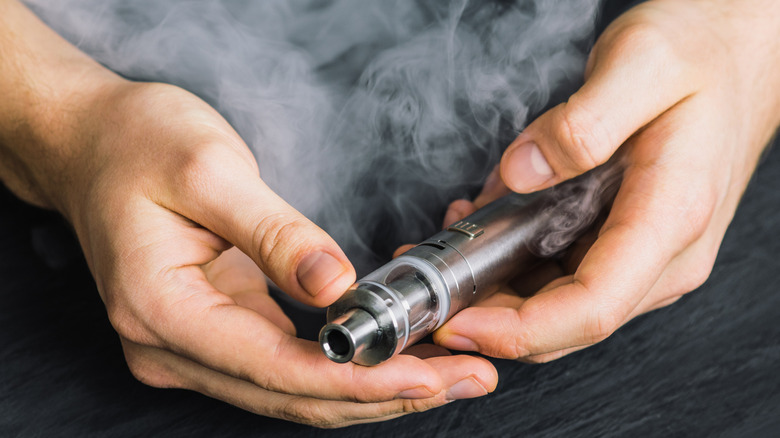What Happens To Your Body When You Stop Vaping
Although vaping was once viewed as a less harmful alternative to smoking, studies have shown that vapes, or e-cigarettes, can actually cause serious health problems. This is largely because the substances found in most vaping products, like heavy metals and toxic chemicals, have been linked to an increased risk of cancer and lung disease (via Bustle). Just as vaping can negatively impact your body and your health, quitting can also elicit a number of bodily reactions.
Quitting vaping may reduce inflammation. Vaping can lead to an increase of white blood cells in the airway, which can cause inflammation and shortness of breath. After you quit, the number of white blood cells will likely decrease, improving symptoms and reducing inflammation in the airway. Quitting vaping may also improve the quality of your lungs over time. Much like smoking, vaping changes the immune cells, or macrophages, in your lungs. Since studies have found that quitting smoking can help these macrophages recover after six months or so, quitting vaping may yield the same results, although further research is needed.
In addition, quitting vaping can improve your heart health (via The Healthy). Vaping constricts your blood vessels and changes the lining of your heart, increasing your risk of having a heart attack. Quitting, however, can improve your circulation, lower your blood pressure, and cut your risk of experiencing a cardiac episode in half.
How to quit vaping
Like smoking, quitting vaping can be difficult, but it can also vastly improve your health and overall quality of life. If you're thinking about quitting, there are a few things you can do to help achieve your goal. First, you should try to identify why you want to quit in the first place (via Healthline). Whether it's because of health concerns or loved ones, acknowledging your motivation for quitting can be helpful and keep you focused on your main objective.
It might also help to plan ahead and pick a certain time to quit vaping. Quitting at a particularly stressful moment in your life may not be ideal. If this is not an option, however, support from friends, family, or even a therapist can make all the difference. While some people prefer to quit gradually and wean themselves off vaping, studies have shown that quitting cold turkey can be more effective in both the short-term and the long-term. People who quit cold turkey are more likely to stay abstinent for weeks or even months later. However, what works for you may not work for someone else. Ultimately, any method that helps you quit is the right method for you.


